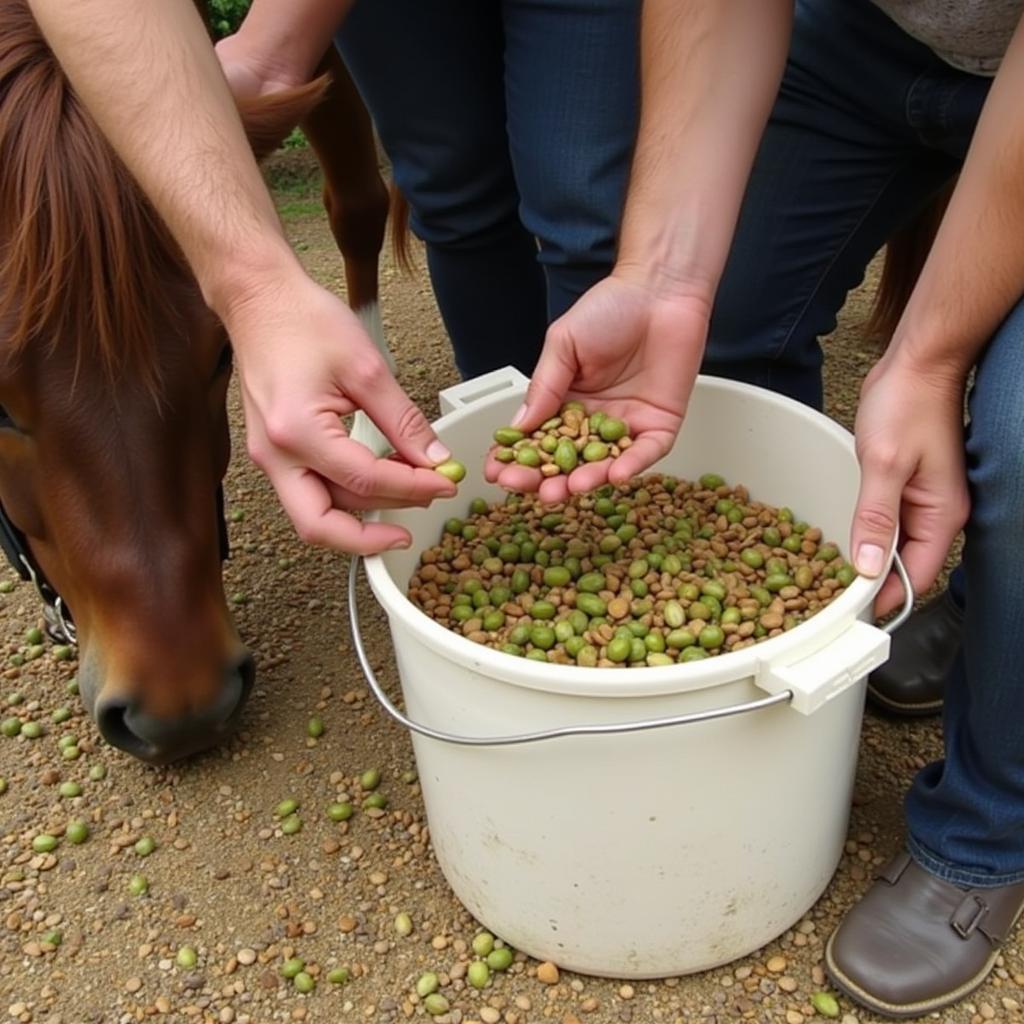Horses Beans, or more accurately, fava beans, are a topic that sparks curiosity among horse owners. Can horses safely consume these legumes, and if so, what are the benefits and potential risks? This article delves into the world of horses and fava beans, providing you with a comprehensive understanding of their nutritional value, safe feeding practices, and potential concerns. can horses have green beans are another popular treat, and understanding the differences between various legumes is crucial for equine health.
Decoding the Nutritional Value of Fava Beans for Horses
Fava beans, while not a traditional part of the equine diet, offer a surprising array of nutrients. They’re a good source of protein, essential for muscle development and repair, which is vital for working horses and growing foals. Fava beans also contain fiber, which aids in digestive health, and various vitamins and minerals, contributing to overall well-being. However, it’s crucial to remember that moderation is key. While these beans can be a healthy addition to a horse’s diet, they shouldn’t replace core feed components like hay and pasture.
Can Horses Eat Fava Beans Safely? Potential Risks and Precautions
While fava beans can provide nutritional benefits, introducing them to a horse’s diet requires caution. Some horses may have sensitivities or allergies to legumes, leading to digestive upset or skin reactions. Start by offering a small amount and observe your horse for any adverse effects. Another concern is the potential for favism, a genetic condition that causes red blood cell breakdown in susceptible individuals. While rare in horses, it’s essential to be aware of the risk. If you notice any unusual symptoms after feeding fava beans, such as lethargy, jaundice, or dark urine, consult your veterinarian immediately.
Feeding Fava Beans to Horses: Best Practices
Introducing fava beans should be done gradually. Begin with a small quantity, mixed with the horse’s regular feed, and monitor their reaction. Gradually increase the amount over several days, if no adverse reactions occur. Avoid feeding moldy or spoiled beans, as these can be toxic to horses. garlic salt for horses is another topic horse owners often inquire about, and understanding safe feeding practices for all supplements is crucial. Always ensure fresh, clean water is available for your horse, especially when introducing new foods.
 Safe Fava Bean Feeding Practices for Horses
Safe Fava Bean Feeding Practices for Horses
## Horses Beans as a Treat: A Healthy Supplement or Potential Hazard?
So, are fava beans a healthy treat or a potential hazard? The answer, as with many things concerning equine nutrition, is: it depends. When introduced properly and fed in moderation, fava beans can provide a nutritious supplement to a horse’s diet. However, it’s crucial to be aware of the potential risks and to monitor your horse carefully for any adverse reactions. can horses eat clover is another common query, highlighting the importance of understanding the various plants horses may encounter.
Dr. Emily Carter, DVM, specializing in equine nutrition, advises, “Fava beans can be a valuable addition to a horse’s diet, providing extra protein and fiber. However, always prioritize quality hay and pasture as the foundation of their nutritional intake.”
Conclusion: Integrating Horses Beans into a Balanced Equine Diet
Horses beans, specifically fava beans, can be a beneficial addition to a horse’s diet when introduced carefully and fed in moderation. Always prioritize the core components of hay, pasture, and balanced feed. By understanding the nutritional value, potential risks, and best feeding practices, you can make informed decisions about incorporating fava beans into your horse’s nutritional plan. Remember to consult with your veterinarian for personalized advice tailored to your horse’s individual needs. horse vegetable provides further information on suitable vegetable options for horses. coffee and horses discusses another surprising dietary consideration for horse owners.
FAQ:
- Can all horses eat fava beans?
- What are the signs of fava bean intolerance in horses?
- How much fava beans should I feed my horse?
- Are dried fava beans safe for horses?
- Can I feed fava bean plants to my horse?
- What are alternative protein sources for horses?
- How do I store fava beans for horses?
Need More Help?
For personalized advice and support for your horse’s nutritional needs, contact us:
Phone: 0772127271
Email: [email protected]
Address: QGM2+WX2, Vị Trung, Vị Thuỷ, Hậu Giang, Việt Nam
Our customer care team is available 24/7 to assist you.